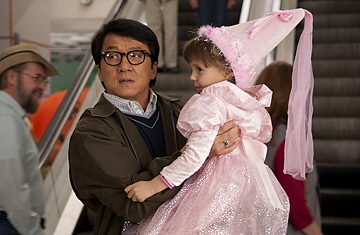
Jackie Chan and Alina Foley in The Spy Next Door
When Hollywood wants to extend the life of one of its movie tough guys, expand his audience and give him a dose of humiliation, it pairs him with a kid. Arnold Schwarzenegger, Bruce Willis, Dwayne "The Rock" Johnson and John Travolta have all endured this mid-career ordeal. Now it's Jackie Chan's turn, in the PG-rated The Spy Next Door. At 55, he is well past his prime as the Hong Kong martial-arts sensation who wowed the world by doing all his own stunts in the Project A, Police Story, Armour of God and Drunken Master franchises, which he parlayed into success in the West with the Rush Hour series. Lately, Chan has settled into a more modest double life: making broad action comedies on both sides of the Pacific. This latest American effort is a deplorable, but also forgettable and forgivable, episode in his checkered Hollywood career.
Bob Ho, Chan's character in The Spy Next Door, has a double life too. He's both Clark Kent — a bespectacled, mild-mannered pen importer in a Western suburb — and Superspy, working for the Chinese and American governments. Now he's received his hardest mission: babysitting the three children of his next-door neighbor and girlfriend (Amber Valletta) when she leaves town to care for her father. "I brought down dictators," Bob says to one of his fellow spies. "How tough can three kids be?" He soon finds out; but what Bob undergoes is a day on the couch compared with what Chan suffers at the clumsy directorial hands of Brian Levant (Beethoven, The Flintstones) and arrant typing fingers of the screenwriters, two of whom are responsible for the all-time-awful Larry the Cable Guy: Health Inspector. It's as if Jackie had committed some terrible crime, and this was the sentence.
The premise of one man and three kids is a mild twist on the plot of Robin-B-Hood, one of the later, lesser action comedies Chan made back home, in which three men are put in charge of one baby. There, the infant was essentially a prop for the stunts and comedy: it revolves inside a washing machine, sucks hard on Jackie's nipple and, during a car chase, is tied to the back of a fast-moving security van. (At the climax it gets revived with jumper cables.) In Hollywood movies such behavior is unacceptable; it's children who get to abuse adults by sassing and sabotaging them. Farren, the 13-year-old (Madeline Carroll), who's navigating puberty with the ease of the Exxon Valdez sailing through Prince William Sound, uses a garden hose as a trip wire, sending Bob head first into a garbage can. Kids! Couldn't you just... find them tremendously annoying?
Rather than do what any sensible Chinese parent would with obstreperous children — send them away to work 14-hour days in a textile factory — Bob sets about quietly educating Farren, her 9-year-old brother Ian (Will Shadley) and kid sister Nora (Alina Foley), 4, in social graces. Eventually he has charmed and awed them into submission, by inadvertently putting them in the crossfire between some evil Russkies and his CIA contacts (George Lopez and Billy Bob Thornton), and by exposing himself to grievous bodily stunts.
That's what we're here for, those of us who aren't following Bob's lead by trying to distract and sedate our kids at the movie house. For three decades, Chan's footwork and brazenly masochistic showmanship were the foundation for sequences never topped in action-film history. Some of them — the shot in The Armour of God II: Operation Condor, for example, where Jackie drives his motorcycle off a riverside pier and leaps off in midair to catch onto the net of a passing mechanical crane — are shown here in clips, to establish Bob's espionage expertise. Other acrobatics, like the amazing descent down a four-story shopping-mall pole in the original Police Story, Chan reenacts in milder fashion, befitting an elder statesman of knockabout melodrama. Spy's stunt coordinators (Wu Gang, who's worked with Chan for the past decade, and Bob Brown) give the star some hand-to-frying-pan legerdemain in the kitchen, which is just fancy enough to remind you how great Jackie once was.
A few moments summon the mood of those Cantonese-language classics, as when Chan gently sings a Chinese lullaby to the four-year-old. In another scene he tells Farren that, back in Hong Kong, he'd been an orphan raised in a foster home: "I had dozens of brothers and sisters," he says, "and I wasn't related to any of them. But I loved them all." Any Chan fan will know that this dialogue refers to the martial arts school where Jackie was sent at 7; where he studied with later costars Yuen Biao and Sammo Hung; and where the craft he would so ferociously master was beaten into him.
Those skills have naturally rusted with age; now he must rely on his ingratiating good nature and comedic gifts, which he can still display in abundance. That imperishable affability, that eagerness to please his Hollywood bosses, allows Chan to elude many of the indignities thrown his way in The Spy Next Door. It may also be the reason he says yes to a junky movie like this.
